|
|
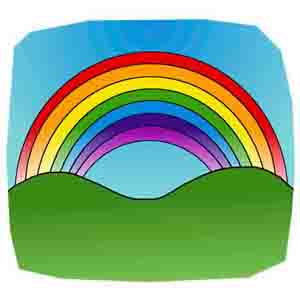 We’re going to point to colors in the rainbow. Can you…
|
|
|
|
|
|
|
|
|
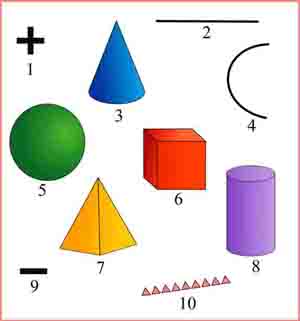 Look at all the shapes below. Can you point to the…
|
|
|
|
|
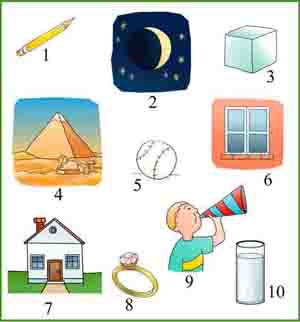 Look at all the objects below. They resemble shapes you know. Point to an object that resembles a…
|
|
|
|
|
|
|
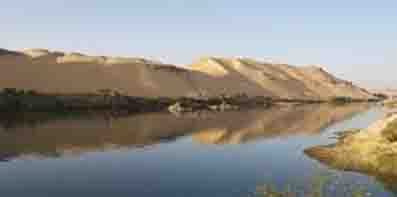 Egypt and its River
by Edith A. How, B.A. Egypt and its River
by Edith A. How, B.A.
1 Egypt is a country in the north of Africa. It has sea to the north and sea to the east. On the north it is called the Mediterranean Sea, and on the east the Red Sea. On the west is the great sandy desert called the Sahara, and to the south are great forests and mountains.
2 Egypt itself is the land of the great River Nile. There is very seldom any rain there, and everyone has to get water from the great river. So all the people live near the Nile or the canals that lead out of it. A "canal" is a waterway, the channel of which has been dug by men. The big towns are where the river flows out into the sea, or where a canal meets the main stream, because the people bring their merchandise to market in boats.
3 All over the land are little villages, where many people live and work in the fields to grow food. Year by year when there is heavy rain in the mountains far away south, the River Nile rises and floods the fields. Then the people plant their seed quickly and get a good harvest. It is not difficult to understand why the egyptians love their great river, which gives them water for their fields and carrys them in their boats from place to place.
|
|
|
|
|
|
|
Read “The Ant and the Grasshopper” and “The Bear and the Two Travelers” and answer the questions that follow.
The Ant and the Grasshopper
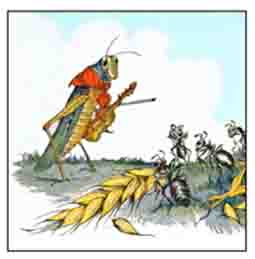
In a field one summer's day a Grasshopper was hopping about, chirping and singing to its heart's content. An Ant passed by,
bearing along with great toil an ear of corn he was taking to the nest.
"Why not come and chat with me," said the Grasshopper, "instead of toiling and moiling in that way?"
"I am helping to lay up food for the winter," said the Ant, "and recommend you to do the same."
"Why bother about winter?" said the Grasshopper; we have got plenty of food at present."
But the Ant went on its way and continued its toil.
When the winter came the Grasshopper had no food and found itself dying of hunger, while it saw the ants distributing every day corn and grain from the stores they had collected in the summer. Then the Grasshopper knew:
It is best to prepare for the days of need.
|
The Bear and the Two Travelers
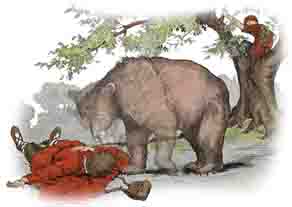
TWO MEN were traveling together, when a Bear suddenly met them on their path. One of them climbed up quickly into a tree and concealed himself in the branches. The other, seeing that he must be attacked, fell flat on the ground, and when the Bear came up and felt him with his snout, and smelt him all over, he held his breath, and feigned the appearance of death as much as he could.
The Bear soon left him, for it is said he will not touch a dead body. When he was quite gone, the other Traveler descended from the tree, and jocularly inquired of his friend what it was the Bear had whispered in his ear. "He gave me this advice," his companion replied.
"Never travel with a friend who
deserts you at the approach of danger."
|
|
|
|
|
|
|
|
|
|
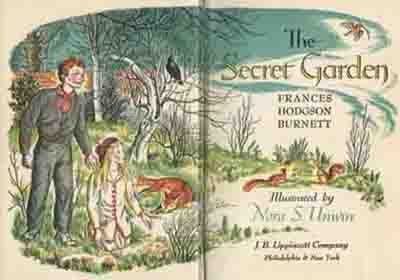 The following excerpt was taken from the book The Secret Garden, written by Frances Hodgson Burnett. The following excerpt was taken from the book The Secret Garden, written by Frances Hodgson Burnett.
When Mary Lennox was sent to Misselthwaite Manor to live with her uncle everybody said she was the most disagreeable-looking child ever seen. It was true, too. She had a little thin face and a little thin body, thin light hair and a sour expression. Her hair was yellow. Her face was yellow, too, because she had been born in India and had always been ill in one way or another. Her father had held a position under the English Government and had always been busy and ill himself. Her mother had been a great beauty who cared only to go to parties and amuse herself. She had not wanted a little girl at all. When Mary was born she handed her over to the care of an Ayah, who was made to understand that if she wished to please the Mem Sahib she must keep the child out of sight as much as possible.
So when she was a sickly, fretful, ugly little baby she was kept out of the way. When she became a sickly, fretful, toddling thing she was kept out of the way also. She never remembered seeing familiarly anything but the dark faces of her Ayah and the other native servants. Because they always obeyed her and gave her her own way in everything, by the time she was six years old she was as tyrannical and selfish a little pig as ever lived. The young English governess who came to teach her to read and write disliked her so much that she gave up her place in three months. When other governesses came to try to fill it they always went away in a shorter time than the first one. So if Mary had not chosen to really want to know how to read books she would never have learned her letters at all.
One frightfully hot morning, when she was about nine years old, she awakened feeling very cross. She became crosser still when she saw that the servant who stood by her bedside was not her Ayah.
"Why did you come?" she said to the strange woman. "I will not let you stay. Send my Ayah to me."
The woman looked frightened, but she only stammered that the Ayah could not come. When Mary threw herself into a passion and beat and kicked her, she looked only more frightened and repeated that it was not possible for the Ayah to come to Missie Sahib.
There was something mysterious in the air that morning. Nothing was done in its regular order. Several of the native servants seemed missing, while those whom Mary saw slunk or hurried about with ashy and scared faces. But no one would tell her anything and her Ayah did not come. She was actually left alone as the morning went on. At last she wandered out into the garden and began to play by herself under a tree near the veranda. She pretended that she was making a flower-bed. She stuck big scarlet hibiscus blossoms into little heaps of earth. The entire time she was growing more and more angry and muttering to herself the things she would say and the names she would call Saidie when she returned.
|
|
|
|
|
|
|
|
|
|
|
|
|
|
|
|
|
|
|
|
|
|
|
|
|
